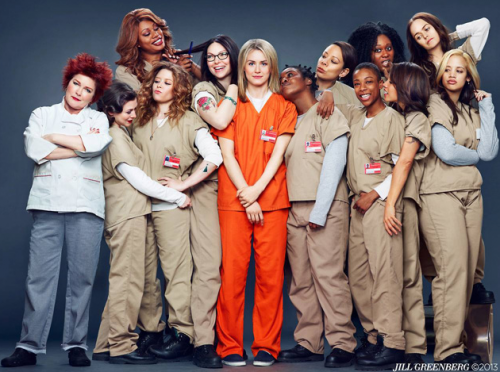Orange Is the New Black: Reviewing Cultural Beliefs Surrounding Gender Shame, Gender Expectations, Gender Non-Conformity, and the Presentation of Human Sexuality
**Spoiler alert: This post includes plot points from throughout the first season of “Orange Is the New Black.”
On July 11th, Netflix released its newest original video-streaming series, Orange Is the New Black. Based on Piper Kerman’s memoir chronicling the 13 months of a 15 month sentence she severed at a minimum security prison in Danbury, Connecticut for money laundering and drug trafficking, Orange has had the highest first week ratings of any Netflix original series.
The overarching plotline is focused on Piper’s character, a stereotypical upper-middle-class white woman adjusting to the conditions of prison life. However, each episode also focuses on the lives of one of the diverse women living within the prison walls along with her, highlighting numerous sociological issues including race, class, gender, sexuality, power structures, mental health, and the structure of civic systems.
As more newspapers, magazine and bloggers began commenting on the series, I started to notice a pattern among reviews. Critics regularly commented on the “graphic nature” of the series. My initial response to this pattern was to question the ways in which we continue to hold women to a different set of standards with regard to themes of the body, sexual desire, promiscuity and violence than men in similar positions. I figured I would investigate what graphic situations were so problematic that they warranted these “warning labels.”
Throughout my search several reviews struck an uneasy chord with me. In a Washington Post review Hank Stuever describes Kate Mulgrew’s character, Red, as “a Russian inmate who runs the kitchen and serves Piper a used-tampon sandwich out of initial spite.” This is immediately followed by the statement, “Warning: The show is full of gross and intentionally unsettling moments; it is prison, after all. With any luck, the sandwich will be the worst of it.”
Piper does not eat the “egg mctampon.” She just stares at it while the other inmates snicker in the background. However, something about this three second shot is shocking to critics. An article in the July 3rd, 2013 edition of the Wall Street Journal provides a fairly detailed description of the breakfast sandwich followed by the words “don’t ask.” Ironically, in a later episode correctional officer Mendez, played by Pablo Schreiber, urinates in a large vat of gravy, which is tasted by one of the inmates. I found no commentary on that scene.
Another review by Emily Nussbaum in the July 8th and 15th, 2013 issue of the New Yorker, stated, “One sequence even slyly builds up the audience’s appetite for savagery, then upends it with something graphically sexual, in a sequence that is sure to gross viewers out.” The gross out scene is a facial close up of Big Boo, a butch lesbian played by Lea DeLaria, bringing herself to orgasm followed by a shot of a stolen screwdriver. Nussbaum makes no reference to a scene in an earlier episode that also climaxed with the implication of masturbation. However, that sequence focuses on male prison administrator Joe Caputo and his first interaction with Piper.
My question is, why are the sights of menstrual blood and the implicated masturbation of a butch lesbian so problematic? These are not new conversations. They speak to classic debates about gendered shame, gender expectations, gender non-conformity, and the boundaries that define what is acceptable in the presentation of human sexuality. Studies have illustrated that although notions of impurity and fear once associated with menstruation have been replaced by new messages framing monthly menses as a natural function, women continue to have negative attitudes towards menstruation (Merskin 1999; Hoerster et al. 2003; Stubbs and Costos 2008). As early as 1953, Alfred Kinsey and his associates were reporting that 62 percent sampled females reported masturbating at some point throughout the course of their lives (Kinsey 1953:142). And although popular media has more frequently depicted women as normal, healthy sexual beings in recent years, there is still an overall sense of invisibility associated with women’s masturbation (Fahs and Frank 2013).
Netflix series are not restricted by the same ratings and viewer binds that impact the content and creative license of mainstream television shows; there is freedom to be a bit edgier, push boundaries, and instigate discussions on important but slightly taboo social issues. And writers of Orange do push viewers to the edge. However, as I read review after review I was left wondering if reviewers were minimizing complicated and deep rooted gendered issues the writers of Orange are bringing to the forefront. Upon further reflection, I began to realize these critiques are actually extremely useful as they highlight how cultural norms perpetuate in our society. In other words, Orange Is the New Black can be seen as a unique tool for challenging viewers to (re)evaluate beliefs about race, class, and social institutions as well as gender, sexual orientation, and the presentation of human sexuality. But the reviews are also critical as they point out exactly what those cultural beliefs are.
Suggested Readings:
Fahs, Breanne and Frank, Elena. (2013). “Notes from the Back Room: Gender, Power, and (In) Visibility in Women’s Experiences of Masturbation.” Journal of Sex Research:1-12.
Kinsey, Alfred C., et al. (1953). Sexual Behavior in the Human Female. Bloomington: Indiana University Press.
Merskin, Debra. (1999). “Adolescence, Advertising, and the Ideology of Menstruation.” Sex Roles 40(11/12):941-957.
Hoerster, Katherine D., et al. (2003). “Attitudes Towards and Experiences with Menstruation in the US and India.” Women & Health 38(3):37-54.
Stubbs, Margaret L. and Costos, Daryl. (2008). “Negative Attitudes Toward Menstruation: Implications for Disconnection Within Girls and Between Women.” Women & Therapy 27(3-4).




1468-0491/asset/society_affiliation_image.gif?v=1&s=859caf337f44d9bf73120debe8a7ad67751a0209)

Great write-up. I was curious about the show but now I am going to check it out. I usually have a weak stomach against the brutality of prison shows (never could finish Oz) but this one sounds far more interesting. Although the part you talk about with the screwdriver, does sound a tad bit brutal. Not because of the act itself but because of the use of a screw driver.
It’s not as brutal as you think; she was using only the handle of the screwdriver, not the sharp part.
The scene was actually a very cleverly delayed punchline to another scene in a previous episode, in which the chef complained that phallic-shaped vegetables kept getting stolen from the kitchen.
I think you’ll like the show; it’s a funny and compassionate portrayal of the lives of several female characters – emotionally raw at times but not violent.
As Andrew pointed out, the scene is not brutal at all. The fact that reviewers were so quick to label the shot as “graphic” and “gross” was part of what struck me as I wrote this post.
I hope you’ll check out the series. In addition to bringing up important social issues, “Orange” is also really funny. As someone who isn’t generally interested in comedies, I couldn’t believe how many times I found myself literally laughing out loud.
I hope this is a sign of the kind of series we can expect from Netflix in the future.